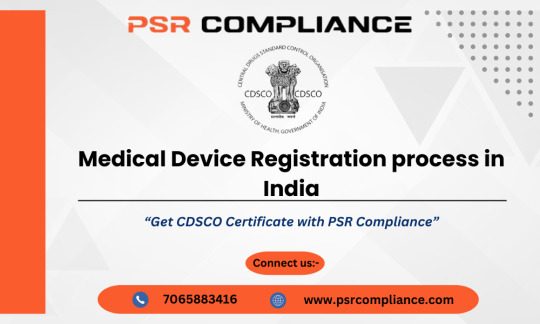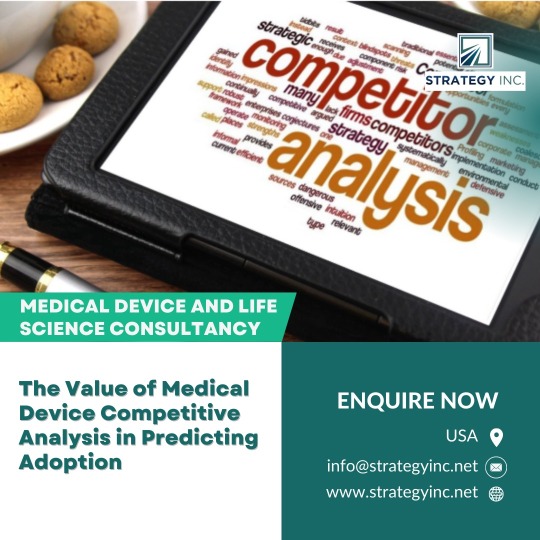#medical device consulting
Explore tagged Tumblr posts
Text
Medical Device Consulting
Since 2007, LSI has been at the forefront of Medtech innovation, guiding leading companies towards growth while always gazing towards the horizon of emerging technologies. Our legacy is not just built on past successes; it's continually renewed through our pursuit of relevance in the fast-evolving Medtech landscape. Our trusted team is here to help you make smarter decisions and form stronger partnerships through curated events, independent market intelligence products and services, and digital-forward media. Get in touch today. For more details visit https://www.lifesciencemarketresearch.com/
0 notes
Text
Medical Device Registration process in India

For medical devices manufactured in India, obtaining a CDSCO manufacturing license is compulsory. This registration ensures compliance with regulatory standards, verifying the safety and quality of the device for use in healthcare. Get in touch with PSR Compliance, a top CDSCO consultant in India.
#Medical Device Manufacturing License#Medical device consulting#Medical Device Registration#Medical Device Registration in India#CDSCO Import License#CDSCO Consultant#CDSCO Certificate#CDSCO Registration#cdsco sugam portal
0 notes
Text
Evaluating a Medical Device Startup for VC Investment
Key Opinion Leaders (KOLs) of emerging medical device technology entities provide insight and guidance to ensure products meet or exceed market expectations. Clinical leaders in specific clinical areas ensures they can impart confidence to potential investors. Their significant insight ensures they are able to confirm the clinical advantages of the medical technology. The unique experience and established influence of the best aligned Key Opinion Leader is a valuable and irreplaceable resource for medical device innovators.
Strategy Inc. has proven expertise to identify and validate leaders in target clinical fields with both the ambition and willingness to collaborate with executives essential to the process. As desired, they can also provide insight on clinical trial strategy.
The Key Opinion Leader Identification and Validation process sources clinicians or healthcare providers with the requisite expertise, level of influence, clinical experience, vision, interpersonal skills and commitment to excellence to provide ongoing insight.
#Medical device consultants#medical device consulting#medical device consulting services#medical device strategy consulting#top medical device consulting firms#best medical device consulting firms
0 notes
Text
#Medical Device Consulting#Medical Device Consultants#Top Medical Device Consulting Firms#Go To Market Strategy Medical Device#Medical Device Competitive Analysis
0 notes
Text
How to Implement Good Manufacturing Practices (GMP) in a Start-up Manufacturing Business
Introduction:
Launching a start-up manufacturing business can be a challenging endeavor. Ensuring quality production, maintaining safety standards, and managing operational efficiency are integral aspects to consider. One key methodology to incorporate from the beginning is Good Manufacturing Practices (GMP). Implementing GMP standards can help assure the integrity of your production process and the quality of your products.
What is GMP?
Good Manufacturing Practices (GMP) is a system that ensures manufacturing products, such as food, cosmetics, and pharmaceutical goods, are consistently produced and controlled according to quality standards. GMP covers all aspects of production, from the raw materials, premises, and equipment to the training and personal hygiene of staff.
Steps to Implement GMP in a Start-Up Manufacturing Business:
Understand the Regulations: The first step is to understand the GMP regulations that apply to your specific industry. Regulations may vary based on the type of products you manufacture. Familiarize yourself with both local and international standards.
Develop a Quality Management System (QMS): A well-documented QMS is the cornerstone of GMP compliance. It should detail the organization’s structure, procedures, processes and resources for implementing quality management.
Infrastructure and Equipment: Ensure your manufacturing facility and equipment adhere to GMP regulations. This includes proper design and layout of the facility, regular equipment maintenance, and suitable sanitation practices.
Raw Material Control: Implement rigorous controls to verify the quality of your raw materials. This includes supplier validation, testing upon receipt, proper storage, and handling procedures.
Train Your Employees: Comprehensive training for employees on GMP standards is crucial. Regular training sessions can ensure your team understands and can effectively implement these guidelines.
Process Validation: Validate your manufacturing process to demonstrate it can operate effectively and reproducibly. This includes qualifying your equipment, validating your methods, and verifying your testing processes.
Implement a Strong Documentation System: Proper documentation is a core element of GMP. It enables traceability and provides evidence of compliance. Document processes, procedures, and record-keeping should be robust and systematic.
Regular Audits and Inspections: Conduct regular internal audits to ensure your GMP systems are effective. Preparing for unannounced inspections is also a good practice to ensure ongoing compliance.
Conclusion:
Implementing GMP from the get-go sets the foundation for a quality-focused, efficient, and competitive manufacturing business. The journey towards GMP compliance is ongoing, requiring continual review and improvement. By understanding and applying GMP principles, start-up manufacturing businesses can not only meet regulatory requirements but also enhance customer trust and brand reputation.
Remember, GMP is not an added cost, but an investment towards sustainability and long-term success.
Website : https://gmppros.com/
0 notes
Text
Medical Device Consulting Services - For assistance with FDA inspections, clinical trials, 510(k) submissions, and more, PDG is your medical device consulting resource. Learn more about our services. https://pharmdevgroup.com/medical-device-consulting/
1 note
·
View note
Text
jolted awake to my alarm at 2:30 PM telling me it was time for my online doctor's appointment so i blearily downloaded the software and logged on looking Exactly like this:

which was mortifying but. in fairness. it was an appointment...... uh...... ABOUT my terrible sleep.
#the consult basically went 'jesus. you have so much going on' 'i know'#god bless the guy's patience i was late bc of oversleeping and needing to switch devices and i filled out my packet late#i'm now going back to bed but. gettin' some tests done and waiting on the rheum consult for the rest of it basically#and got some good advice/info about sleep hygiene and my giant list of current medications.#autoimmune tag
21 notes
·
View notes
Text
Expert Medical Device Regulatory Consulting Services for Compliance Success | Trinity M Consulting

Trinity M Consulting provides expert medical device regulatory consulting services to ensure compliance success. Our team of experienced professionals will guide you through the complex regulatory landscape, helping you navigate requirements and achieve market clearance efficiently. Trust Trinity M Consulting for reliable and comprehensive regulatory support tailored to your specific needs.
#medical device regulatory consulting services#medical device consultants#medical device consulting services#medical device regulatory consulting
2 notes
·
View notes
Text
FPGA in IoT: How Programmable Hardware is Revolutionizing Connectivity
In today’s rapidly evolving tech landscape, the demand for high-performance, customized solutions is greater than ever. One of the most powerful tools available to engineers and developers is FPGA (Field Programmable Gate Array) programming. With its unique ability to offer flexibility, speed, and scalability, FPGA design has become an essential technology for a wide range of applications, from video processing and digital communications to network interfaces and high-speed operations.
What is FPGA Design?
At its core, an FPGA is a programmable silicon chip that integrates memory, logic gates, and other processing elements. Unlike traditional processors, which execute instructions serially through software, FPGAs process data in parallel at hardware speeds. This ability to perform parallel processing allows FPGAs to handle complex tasks much more efficiently than general-purpose microprocessors. As a result, FPGAs are ideal for applications that require real-time data processing, such as Software Defined Radio (SDR), signal processing, and high-performance computing tasks.
One of the standout advantages of FPGA design is its inherent flexibility. With a single chip, engineers can design custom circuits tailored to specific needs, making it possible to achieve high performance with optimized power consumption and reduced physical space requirements. This level of flexibility makes FPGAs an attractive option for both prototyping and low-volume production runs, where traditional hardware might be too costly or time-consuming to develop.
Why Choose FPGA Design?
FPGAs have revolutionized embedded systems and digital circuit design, offering a host of benefits over traditional microprocessors and ASICs (Application-Specific Integrated Circuits). In the past, designing a complex digital system might require numerous separate components or an entire circuit board. With FPGA technology, many of these functions can be integrated into a single chip, reducing both physical space and system complexity. Furthermore, the programmable nature of FPGAs means that once a design is completed, it can be updated or reconfigured as needed without requiring new hardware.
This adaptability is a significant advantage for industries where rapid innovation and continuous improvement are essential. For example, in telecommunications, video processing, and automotive systems, the ability to modify the functionality of the chip without redesigning hardware can be a game-changer. Moreover, FPGAs can handle high-speed operations such as real-time data streaming and video compression, tasks that would be difficult or impossible for a microprocessor to manage.
Leveraging FPGA IP for Faster Development
Another advantage of FPGA programming is the availability of Intellectual Property (IP) cores—pre-designed, reusable blocks of logic that can be integrated into FPGA designs. These IP cores range from basic elements like microprocessors and memory controllers to complex algorithms for digital signal processing (DSP) and phase-locked loops (PLLs). Using these pre-built IPs can significantly reduce development time and effort, allowing engineers to focus on optimizing the custom aspects of their design.

At Voler Systems, we specialize in taking full advantage of FPGA’s capabilities. Our extensive experience in FPGA design and programming, combined with our access to a wide range of IP cores, allows us to deliver efficient, high-performance solutions tailored to meet the unique needs of our clients. Whether you are developing a custom embedded system, a high-speed communication platform, or a complex signal processing unit, Voler Systems can help you maximize the potential of FPGA technology to deliver superior results.
Conclusion:
FPGA design is a powerful tool for anyone seeking to build high-performance, customizable systems. By offering parallel data processing, flexibility, and the ability to integrate multiple functions on a single chip, FPGAs open up new possibilities for innovation. With the help of Voler Systems, you can harness the full potential of FPGA programming to bring your projects to life quickly and efficiently. Whether you are looking to prototype a new idea or deploy a full-fledged product, FPGA technology is a key enabler of success in the digital age.
#Electronics Design Company#Circuit Design Services#Medical Devices Development#Embedded Systems Design#Medical Device Design Consultant
1 note
·
View note
Text
ASC Group ensures hassle-free CDSCO registration for you, as your trusted CDSCO Registration Consultant. We are specialists in medical devices and drug regulatory compliance and offer expert guidance in the license securing process.
#CDSCO Registration Consultant#cdsco consultant#cdsco license consultant#CDSCO medical device consultant#CDSCO consultants in Delhi
0 notes
Text
ASC Group offers expert CDSCO consultants in Delhi, specializing in medical device registration and compliance with Indian regulations. Trust our professionals for efficient guidance and seamless licensing solutions!
#CDSCO consultants in Delhi#CDSCO medical device consultant#cdsco license consultant#cdsco consultant#CDSCO Registration Consultant
0 notes
Link
0 notes
Text
1 note
·
View note
Text
In the dynamic and rapidly evolving field of medical devices, predicting the adoption and market success of a new product is crucial for manufacturers. One effective tool that aids in this process is a competitive analysis performed by medical device consultants. By examining the competitive landscape, identifying key players, and analyzing their strategies, medical device companies can gain valuable insights that inform their decision-making and increase the likelihood of successful market penetration. This article explores the value of competitive analysis in predicting medical device adoption and highlights its significance for manufacturers.
Understanding the Competitive Landscape A competitive analysis involves a systematic examination of the industry, market trends, and key competitors. In the medical device sector, this analysis encompasses factors such as regulatory environment, technological advancements, customer preferences, and pricing dynamics. By understanding the competitive landscape, manufacturers can gain insights into existing and potential competitors, market gaps, and the overall market size and potential.
Identifying Key Players Competitive analysis enables medical device manufacturers to identify and evaluate key players in the industry. This includes both direct competitors who offer similar products and indirect competitors who address the same healthcare needs using alternative solutions. By studying the strategies. strengths, weaknesses, and market positioning of these players, manufacturers can assess their competitive advantage and develop effective differentiation strategies
#Medical Device Consulting#Medical Device Consultants#Top Medical Device Consulting Firms#Go To Market Strategy Medical Device#Medical Device Competitive Analysis
0 notes
Text
The Value of Competitive Analysis in Predicting Medical Device Adoption

The Value of Competitive Analysis in Predicting Medical Device Adoption
#Medical Device Consulting#Medical Device Consultants#Top Medical Device Consulting Firms#Go To Market Strategy Medical Device#Medical Device Competitive Analysis
0 notes